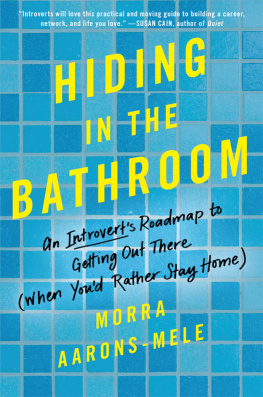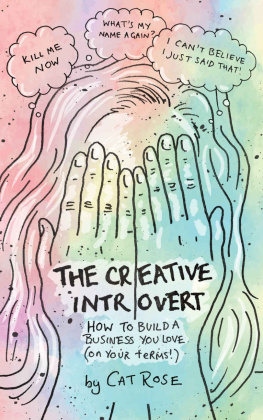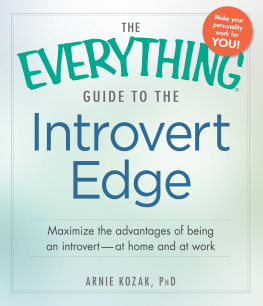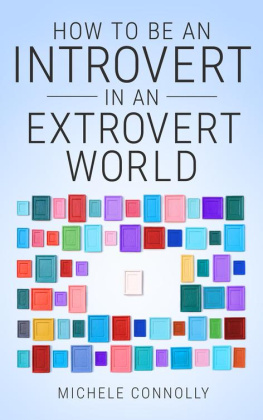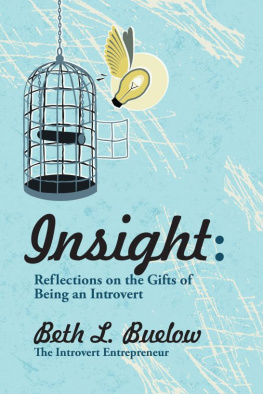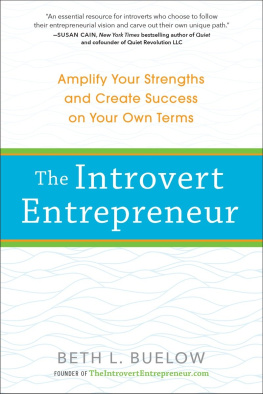To my husband Nicco Mele,
who I love so deeply and learn from every day.
And to Rachel Sklar and Glynnis MacNicol of TheLi.st,
two women who lead fearlessly and give generously.
And finally to my mom, Pamela Aarons,
who taught me how to be strong.
N etwork your way to the top.
Always say yes.
Never eat lunch alone.
Get out there!
If youre an overachiever like me, youve definitely heard this advice. And, if youre ambitious, you also probably believe that to be successful, you have to be out there 24/7, tirelessly pressing the flesh, doing deals, tweeting, and keynoting conferences. That theres a successful typethe intense, sleepless mover and shaker, the person who leans in and musters endless amounts of grit. And if you dont fit that type, well, youre out of luck.
I call bullshit.
Much of what we think we must do to succeed is unnecessary and even counterproductive. Ive interviewed over one hundred fifty successful entrepreneurs and executives, and I can tell you that most of them arent the always-on, outgoing superstars we would assume. One new media CEO whose viral videos have garnered over a hundred million views told me that she experiences major anxiety being in a room where she doesnt know anyone. I go straight into awkward middle schooler mode, she confessed. The founder of a biotech firm who just received Series A financing confessed that she hides in the bathroom at conferences, usually because I am crying. A former Wall Street banker who now runs a successful tech start-up has to take beta-blockers for public speaking.
And then theres me. Im a hermit by nature, an extreme introvert, more comfortable at home, with my kids, my cats, and my kitchen than out there selling to a room. Ill admit it: facilitating meetings and giving speeches intimidate and exhaust me. When I fly to meet a potential client or to give a talk, I take so much anxiety-fighting Xanax that Im barely conscious. I manage my social media feeds very tightly, doing just enough to keep me in the game. And yet I own and run a successful business in which I am the primary sales driver.
Hiding in the bathroom has become my shorthand for hacking and faking my way to appearing like a typical successful businessperson. Given my natural inclinations, I would hide almost all the time. I would rarely choose to leave my house. But as extensive as my online network is, I could not sustain a business that way. So Ive learned to get out there, building in strategies and tricks that allay my anxieties and introversion while Im at a professional gathering or client meeting, then creating home time to recharge, be on my own, and do the work.
I used to beat myself up about needing to hide in the bathroom. I would walk into a huge crowd, panic at the number of strangers, and head immediately for the ladies. But over time Ive learned that I often need a moment to reset during a busy workday. Now I know its okay to take a moment to breathe. Then I put on some lipstick, look in the mirror, and tell myself, You can do it. Get out there.
Becoming My Own Kind of Entrepreneur
When I was a kid, I told everyone, I want to be a media mogul. I had a photo of famed Paramount boss Sherry Lansing on my bedroom wall. I wrote my tenth-grade economics paper on the inside story of Barry Dillers bid to own Universal Studios. And, because I had the good fortune of coming of age during the Clinton years, when jobs were plentiful for precocious twentysomethings, I was well on my way. After graduating from college, I worked a series of high-profile jobs in the marketing world and was even recognized in a prominent national top 30 under 30 list.
There was one problem: secretly (or perhaps not so secretly), I was miserable. I tried on many different personas, and adopted countless ad hoc coping mechanisms, but nothing helped. I kept torpedoing my success at every turn. I drank too much at office happy hours and acted inappropriately. My weight constantly went up and down as I bounced between bingeing and barely eating at all. I was anxious almost every day, and had frequent panic attacks. Quite often, I was so depressed that I called in sick to work and hid in bed all day.
At my last job, I was asked to start a department from scratch, and I was too prideful, anxious, and shortsighted to secure allies. Eventually the New York office tried to get me fired. Did this girl stand up and fight like a plucky heroine in a novel? No, she did not. She cried in the bathroom and started working from home as often as she could.
But, when she eventually quit and started freelancing, she became an accidental entrepreneur who focuses more on making time for life than making millions.
I run a business called Women Online. We are a social-impact marketing agency with the sole mission of creating campaigns that mobilize women for social good. I like to say we are small but mighty: even though we have fewer than ten peopleand are virtual at that!we help the largest organizations in the world with digital strategy. For example, we helped President Obamas campaign reach mom bloggers and get them to the polls, and we created digital tools that inspired American families to learn about and support the work of Malala Yousafzai and the United Nations, both on a mission to educate girls worldwide.
Over the last decade, Ive built a life that allows me to earn enough money and find just enough recognition without driving myself crazy and sacrificing my homebody self. I learned to play to my strengths and nourish my introversion, focusing less on the long-term outcome of success and more on the everyday. Today, thanks to the deliberate way Ive organized my business, I can literally be at the UN one day and home with the boys digging in the dirt the next. On the days Im at a clients office, pitching new business or giving a speech, youll probably find me in the ladies in between sessions. Every single day I build in lots of breaks and alone time for myself, even if its just five minutes in a quiet room. Of course, this best-of-both-worlds lifestyle comes at a cost. It has meant sacrifices, less success than some peers, and a slower path. But its my version of success, and I love it.
The aha moment came when I learned to redefine my vision of success. The old vision was media mogul. My new vision was less focused on some far-off notion of success attained. I traded someday for today. For me, its the choice to be a hermit entrepreneur: a mostly tongue-in-cheek term I use to describe my choice to mostly work at home in my yoga pants.
What if you became the kind of success you wanted to be? What if you could enjoy the everyday of your work life? What if you stopped all that networking? What if you distilled your business development to the bare minimum, and still managed to grow your business or your income? What if instead of getting out there, you could simply stay in?
The good news is that you can learn and practice the skills you need to achieve a version of success thats right for you, and make enough money. And Ill give you strategies and concrete career-development and management tools to get there.
These strategies begin with setting a vision and developing realistic goals that satisfy all of your needs, even if it means accepting a more modest career or slower business growth trajectory. Then, manage around your goals in ways that allow for an enjoyable, hermit lifestyle. To maximize your impact with the least amount of face time, you carve out a strong professional niche and digital footprint for yourself. If you own a small business or work freelance, you price your offerings slightly above market rate. You determine the right client, project mix, or type of work that allows you the time you need for yourself. No matter where you work, you create a long-term, professional franchise for yourself that assures you of future jobs, freelance gigs, and business opportunities as well as even more free time in the future. You engage in high-impact, smart networking and only attend a few strategically selected conferences. You track your work flow and scope your work more carefully so as to protect your time for family, friends, and self. And finally, you recalibrate expectations with bosses, spouses, family members, and others.
Next page
